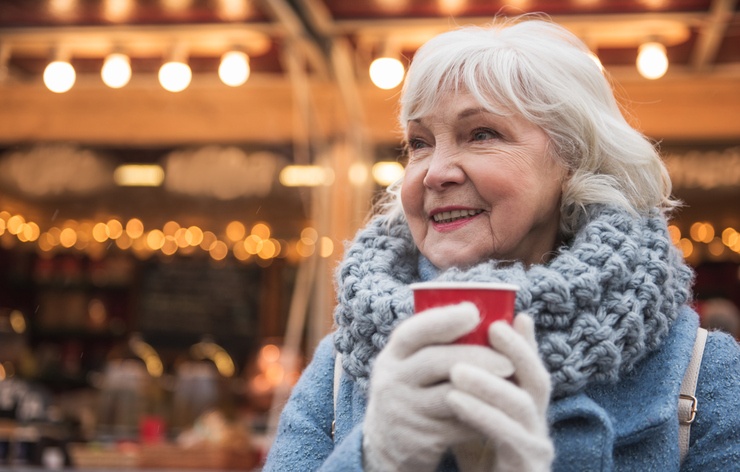Stay warm, happy and healthy winter season.
As we get older, our body slowly loses the ability to regulate body temperatures and sense fluctuations as well as it did in the past. In the winter months, it's especially important for seniors to take care of themselves and stay warm to avoid health risks. One of the most serious health risks seniors face in the winter is hypothermia. It not only occurs in very cold environments, but it can also occur at a meager 60 degrees Fahrenheit. The risks and dangers are a serious threat, however, there are steps and tips seniors can follow to stay warm, happy, and healthy this upcoming winter season.
What is Hypothermia?
Hypothermia occurs when one's body temperature gets very low. For an elderly individual, a body temperature of 95 degrees Fahrenheit or lower can cause hypothermia which can also lead to health problems including a heart attack, liver damage, kidney problems, and more. Cold houses, places, and being outdoors can all cause the body temperature to take a major drop.
Warning Signs of Hypothermia
- Slurring words
- Slow speech
- Swollen or puffy face
- Cold feet and hands
- Shivering
- Acting very tired
- Being confused or irritated
- Slow heartbeat
- Losing consciousness
If you notice any of these signs in your loved one or yourself, move to a warmer location, wrap them in blankets, and call 9-1-1 if necessary.
Tips for a Warmer & Healthier Winter:
1. Get the Flu Shot
Seniors aged 65 and older are more at risk than the general population of catching the flu, which is why it's essential seniors get their flu shot. The flu can quickly develop into a serious problem. It can also lead to other illnesses such as pneumonia and potentially cause death. Simply getting the flu shot greatly reduces the chances of catching the flu and lowers the intensity drastically (if diagnosed). The flu shot is completely free through Medicare, so seniors should take full advantage every winter.
2. Wash Your Hands
Protecting yourself from germs is the best line of defense to stay healthy. Washing hands regularly throughout the day will greatly reduce the chances of catching an unwanted illness. The Center for Control and Disease recommends that you wet, lather, scrub with warm water for 20 seconds, rinse thoroughly and dry with a clean paper towel. Washing hands is a proactive way to cut back on winter germs. It even reduces your chances of getting a cold by up to 45%!
3. Hydration is Key
Staying hydrated provides seniors with many great benefits. Drinking more water helps boost immunity, regulate body temperature, increase digestive health, maintain urinary health, enhance metabolism, and increase kidney health. Staying hydrated in the winter is just as important as it is in the summertime. Encourage loved ones to consume water, teas, and healthy shakes to up their liquid intake to help avoid common colds and the flu.
4. Stay Active
Increasing your body temperature can be as simple as walking on a treadmill or lifting weights. Any type of physical activity will get the blood in the body flowing which will result in a higher body temperature. Exercise not only helps to keep our bodies' fit, but it also helps maintain a healthy immune system which is essential for preventing illnesses. Joining a local recreation center, doing at-home workout videos, or visiting an indoor gym is a safe, smart solution for elders to stay warm and healthy.
5. Think Happy Thoughts
Avoiding the cold weather outside often means seniors are cooped up in their homes for extended periods of time. This can lead to isolation, anxiety, and depression. Everyone gets the "blues" from time to time, but if you notice a loved one in your life is struggling with depression for more than a week or two, intervention may be necessary. Seasonal Affective Disorder (SAD) is a type of depression that happens when the seasons change and occurs more often in the winter months.
Symptoms of SAD:
- Having low energy
- Losing interest in their favorite activities
- Experiencing insomnia/sleep problems
- Changes in weight or appetite levels (gain or loss)
- Feeling sluggish
- Having difficulty concentrating
- Social withdrawals
- Having thoughts of death/suicide
Treatment of SAD:
- Medication
- Light therapy
- Psychotherapy
- Vitamin D
- (these may be used alone or combined per doctor's recommendations)
Encourage your loved ones to stay active, engaged, and communicate with someone if they are having a tough time thinking happy thoughts this winter. Click here for some great activity’s seniors can engage in this winter to avoid boredom and the "blues".
6. Dress in Layers
Wearing several dry, loose layers of clothing will cause warm air to get trapped between them, creating a comfortable and warm body temperature in cold weather. (Avoid tight clothes which can stop blood from flowing, causing loss of body heat.) Wearing hats, scarves, and gloves outside or when feeling chilly is also a great idea. Remember that the majority of body heat is lost through your head, hands, and feet. Always make sure to check the forecast for the day and dress accordingly or avoid going outside completely if the weather is extremely cold.
For more information on how seniors can stay warm & healthy this winter, contact Church Home LifeSpring today. We're here to help!

